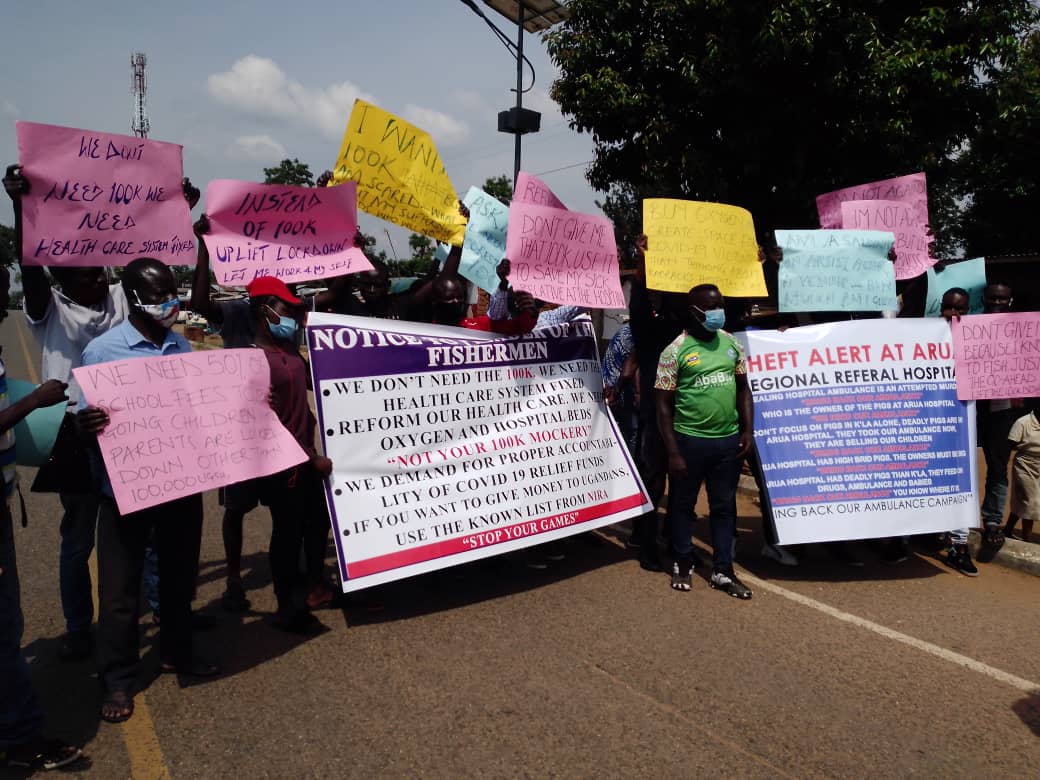Uganda is marred with a turbulent history of political violence and unrest. Our history created scared minds and hearts for those who lived through wars and several injustices. The NRM government came to power through violence while promising people peace and security. Thousands of lives were lost during the NRA bush war in 1986. They came to power with a promise of peace that the people held onto. Almost four decades later, the promised peace has been eroded by NRM’s greed for power, corruption, police and army brutality, extrajudicial killings, land grabbing, poor service delivery and all other forms of injustices. Peace, security, and Economic freedom have remained a dream.
For the past eleven years (11) Solidarity Uganda has been supporting the oppressed in building collective power to achieve social and political change. We do this through inspiration, education, and action. This is our strategy for change because we believe that without inspiration, oppressed peoples may remain idle, without education, they may use ineffective means of change (like violence) or fail to capitalize on their people power potential and without action, nothing will change. We focus on building resilience of communities through training and organizing.
Training in nonviolent resistance is indeed fundamental for those looking to achieve lasting social and political change. Nonviolent resistance, also known as nonviolent action or civil resistance, is a powerful strategy that relies on peaceful means to bring about social, political, or economic transformation. It involves using various methods such as protests, strikes, boycotts, sit-ins, and other nonviolent tactics to challenge oppressive systems, demand justice, and promote positive change.
We have greatly invested in training in nonviolent resistance because it is crucial for those seeking lasting social and political change.
Training in nonviolent resistance empowers individuals and communities to take collective action and mobilize effectively. It equips them with the knowledge and skills needed to organize and sustain peaceful movements, amplifying their voices and demands.
“I thank Solidarity Uganda for training the Benet community on nonviolent methods of waging against oppression and injustice. We’ve been able to put up commendable resistance against the Uganda Wildlife Authority from grabbing our land.” Yesho Alex-Kween
Nonviolent resistance encourages broad participation from different segments of society, including marginalized groups. It can create a united front by bringing together people from diverse backgrounds who share common grievances and aspirations, making movements stronger and more inclusive.
Nonviolent movements tend to garner more public support and sympathy compared to violent ones. Peaceful protests and actions resonate with people’s sense of justice and fairness, increasing the legitimacy of the movement’s goals and demands. Most Ugandans abhor violence. It is therefore easier to win their support and involvement if there is no violence involved in the tactics employed. They understand that their oppressor is much more powerful, and they cannot win with the same violence that is meted on them.
“Solidarity Uganda has empowered us to know our rights. We are now able to own our fight against injustice in our community.” Alex Kipsang, Benet Indigenous people
Nonviolent resistance can be disruptive to the status quo without resorting to violence or causing unnecessary harm or destruction. It forces the powerholders to address the issues at hand without causing widespread destruction, making it more likely for positive changes to be implemented.
Violent methods might achieve fast and short-term gains, but they often create a cycle of violence that hinders lasting change (this is the case with the NRM government). Nonviolent resistance, on the other hand, is more likely to build a foundation for long-term sustainability and societal transformation.
International Attention and Solidarity: Nonviolent movements often gain international attention and support. They can attract media coverage, engage international organizations, and receive solidarity from people and governments worldwide, increasing the pressure on oppressive regimes or authorities. The people power movement has greatly benefited from international solidarity because of its nonviolent strategy. Several solidarity chapters continue to receive international and local solidarity because they uphold the principles of nonviolent resistance gained through our trainings and grassroots organizing.
After being trained, I took part in the bicycle caravan to protest against a land grabber in Kumi district. Immediately after the caravan, the land grabber was chased away and the land was regained, that is the power of nonviolence activism.” Christine Amongin, community organizer
Nonviolent movements often highlight the oppressive and violent nature of the opposition, leading to moral and psychological advantages. These movements can expose the brutality of oppressive regimes, leading to defections within the ruling establishment or security forces.
Whereas violence creates deeply entrenched physical and psychological wounds, Nonviolent resistance lays the groundwork for reconciliation and healing after the conflict has ended. It reduces animosity between conflicting parties, making it easier to build a more inclusive and peaceful society.
“I’m grateful to Solidarity Uganda for equipping us with skills and knowledge on how to fight corruption nonviolently. In Kiyere police station, Serere district, we arrested a corrupt police officer who was found demanding a bribe of Uganda shilling 30,000 from a complainant. We captured footage of him receiving a bribe which we used against him in ensuring he faced the law” Jesca Kongai, community organizer.
While nonviolent resistance has shown remarkable successes in various historical and contemporary contexts, it is essential to acknowledge that its effectiveness can be influenced by many factors, including the nature of the opponent, the level of repression faced, and the strategic planning of the movement. Therefore, proper training and strategic thinking are crucial to maximizing the potential impact of nonviolent resistance in achieving lasting social and political change.

